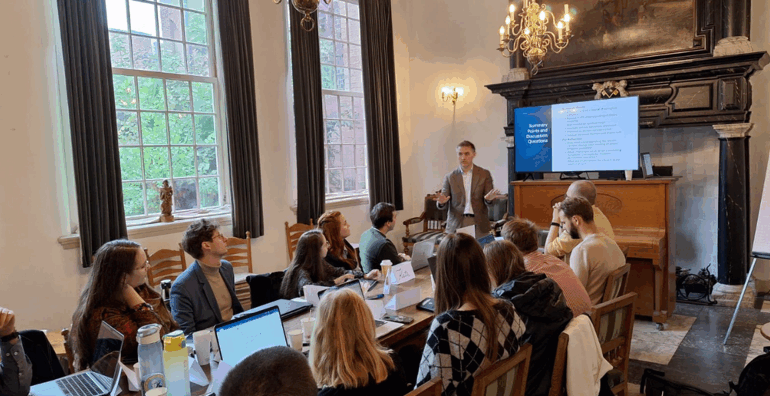The students of the Debrecen Reformed Theological University and I myself look back with grateful hearts on this year’s Erasmus+ BIP mobility program held in Utrecht, the Netherlands.
Six of our students participated in this journey, which turned out to be far more than an academic exchange it became a truly transformative community experience. What made it so special was not only the theological depth of the lectures but the remarkable group dynamics that emerged among participants from four different institutions.
The program, jointly organized by the Protestantse Theologische Universiteit, the Theologische Universiteit Utrecht, the Debrecen Reformed Theological University, and the Protestant Theological Institute of Cluj, offered an ideal environment for intercultural and interdenominational dialogue. Through teamwork, shared discussions, and collaborative reflections, we experienced first-hand how diversity can enrich theological understanding. The openness and curiosity of each participant helped us create a genuine learning community where every contribution mattered.
Our heartfelt gratitude goes to the staff of DRTU, whose careful coordination and genuine care ensured that not only our academic progress but also our group cohesion flourished throughout the week.
Reflecting on this experience, I see how God’s guidance was present not only in the content of our studies but in the relationships built among us. Morning devotions and shared prayers grounded our group spiritually and created a deep sense of unity a reminder that seeking the Kingdom of God is not merely an intellectual pursuit but a communal journey.
I was also deeply impressed by how our hosts went beyond academic hospitality. They did not only guide us into the theological depth of the “Kingdom of God” theme but also invited us to experience their church culture. They showed us around the city of Utrecht, took us to local congregations, and arranged visits to the St. Peter’s Church, the local museum, and even an evening prayer meeting organized by the university’s student fellowship. These encounters helped us see theology embodied in everyday faith and community life.
The lectures themselves were insightful and well-structured, but what stood out most were the group discussions and workshops. Working together in small groups sometimes overcoming language barriers and different theological backgrounds strengthened our ability to listen, collaborate, and grow together. Especially memorable were the library sessions, where we worked in pairs on Old Testament texts, and the lively post-lecture discussions that turned abstract ideas into shared discoveries.
I would like to especially highlight our Tuesday session, when after the lecture we had the opportunity to work together in the library. This time was particularly valuable for me, as we divided into smaller groups or pairs, allowing everyone to participate more actively in the analysis. I found it very useful that we could study our pericopes with the help of various books and resources biblical commentaries, lexicons, and academic works all contributed greatly to a deeper understanding of the text. It was also a positive aspect that we had more time for each contribution, which allowed us to share our thoughts more calmly and thoughtfully, giving everyone a chance to engage meaningfully in the discussion.
I also found Wednesday’s session very helpful, when we studied the texts together. Reading and discussing them collectively not only deepened my understanding but also allowed me to hear and learn from others’ insights and perspectives. This collaborative reflection was truly inspiring. It was also a great help that whenever I did not understand an English expression, I had time to look it up in the Hungarian translation, which made the learning process smoother and more confident. At the same time, it was reassuring to know that I was not left alone with the task we could discuss the key parts together, share our questions and ideas, and learn from one another. Overall, this shared learning experience was both enjoyable and motivating for me.
Beyond the classroom, our group dynamic continued to evolve through shared meals, city walks, and informal conversations. These moments of genuine fellowship made the program not only intellectually enriching but emotionally and spiritually rewarding as well. It was a wonderful experience to meet Dutch university students and students from Cluj, who shared their experiences of local church life and education with us. It was inspiring to hear them talk about their own experiences, challenges, and the opportunities that international cooperation offers them. This meeting encouraged me to think more boldly about participating in the Erasmus program and to develop my English language skills more consciously. I feel it is important to be able to express myself clearly and confidently in both professional and civil environments and to build relationships with people from other cultures.
Looking back, I can confidently say that the Erasmus+ BIP program in Utrecht was not just about learning about the Kingdom of God we experienced something of it together: unity in diversity, service through dialogue, and joy in shared faith.
Fanni Tihor

